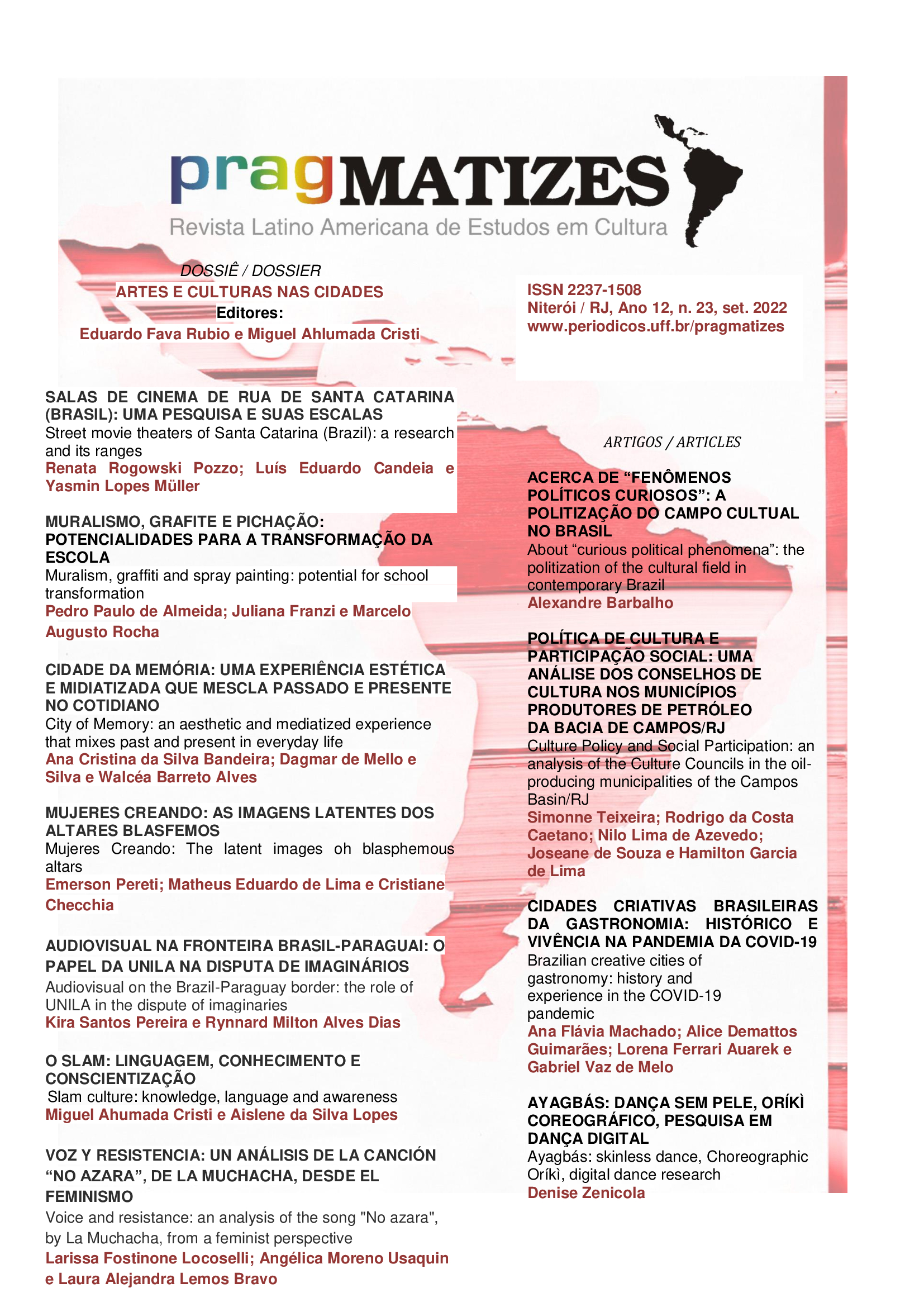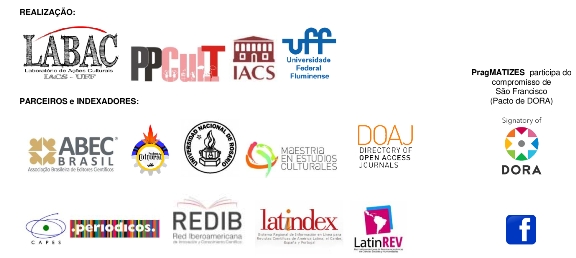Voice and resistance
An analysis of the song "No azara", by La muchacha, from a feminist perspective
DOI:
https://doi.org/10.22409/pragmatizes.v12i23.54730Keywords:
popular song, discourse analysis, feminism, resistance, ColombiaAbstract
Songs sometimes surprise us, they carry within them some messages that detonate at certain moments. "No azara", a composition created by Latin American singer-songwriter Isabel Ramírez Ocampo in May 2021, in the midst of a National Strike in Colombia, echoes the protests of a very important sector of society. We have chosen to do a discourse analysis of the song to glimpse and highlight meanings that come into play in the peoples' action and resistance. The analysis will be unfolded from the very path taken by the song, along the seven stanzas of the work, and will be taken into consideration: the construction of the subject of resistance in the lyrics of the song, from the memories of meaning summoned in it facing the socio-historical context (especially some historical-political and cultural aspects of Colombia) and trying to consider as much as possible also the musical and vocal performance. Our analysis is articulated by the fact that we assume a reading of the song from feminism, so that we propose to it a dialogue with the Afro-Latin American feminist thought of Lélia Gonzalez (1988), the perspective of feminism for the 99% proposed in the manifesto of Cinzia Arruzza, Tithi Bhattacharya and Nancy Fraser (2019) and, finally, the decolonial reading of the gender issue, from María Lugones (2014) and Françoise Vergès (2020).
Downloads
References
ALBURQUERQUE. Hermanamientos para el desarrollo. Integración de la educación para el desarrollo en los hermanamientos de los municipios extremeños. Musol. La comunidad de Paz de San José de Apartadó. Disponible en: https://musol.org/hermanamientos/Alburquerque/san-jose-de-apartado-comunidad-de-paz. Acesso em: 26 set. 2021.
ARRUZZA, Cinzia; BHATTACHARYA, Tithi; FRASER, Nancy. [Tradução de: Heci Regina Candiani] Feminismo para os 99%. São Paulo: Boitempo, 2019.
CALSAMIGLIA, Helena; BLANCÁFORT, Amparo. Las cosas del decir. Editora Ariel. 199. Disponible en: https://universitas82.files.wordpress.com/2013/08/las-cosas-del-decir.pdf. Acesso en: 21 dic. 2021
CARVATO, Jonny. La Muchacha. Un grito que se hace poema. 2015. Revista Alternativa. Disponible en: https://alternativa.com.co/2020/05/15/la-muchacha-un-grito-que-se-hace-poema/. Acesso en: 28 feb 2021
CRIC - CONSEJO REGIONAL INDÍGENA DEL CAUCA. De la Minga al paro nacional seguimos sembrando semillas de esperanza. Disponible en: https://www.cric-colombia.org/portal/de-la-minga-al-paro-nacional-seguimos-sembrando-semillas-de-esperanza/. Acesso em: 21 dic. 2021.
CAPITAL CRÓNICAS. ¿Quién es Isabel, La Muchacha? .2021. Disponible en: https://www.youtube.com/watch?v=W0QMTakmI_Q&t=4s. Acceso en: 28 feb. 2022.
GARCÍA, José Pascual Mora; ALFONSO, José del Carmen Correa. La minga como imaginario social. Una mirada a la pedagogía de resiliencia indígena en Colombia. Rev. Hist.Edu.Latinoam, [S. L.], v. 22, n. 35, p. 163-180, jul./dic. 2020. Semestral. Disponible en: http://www.scielo.org.co/scielo.php?pid=S0122-72382020000200163&script=sci_abstract&tlng=pt. Acceso em: 16 dez. 2021.
GONZÁLEZ, Lélia. Por un feminismo latinoamericano. In: MUDAR, Mujeres Por Un Desarrollo Alternativo - (org.). Mujeres, crisis y movimiento : América Latina y El Caribe. 9. ed. Santiago: Isis Internacional, 1988. p. 133-141.
IN-CORRECTO. In-Correcto 070: No azara. 2021. Disponible en: https://in-correcto.bandcamp.com/track/in-correcto-070-no-azara. Acceso en: 04 mar. 2022.
KRISTEVA, Julia (1988). El lenguaje, ese desconocido. Introducción a la linguística. Editorial Fundamentos.
MARTÍNEZ, Miguel. Comunidad de paz de San José de Apartadó, 22 años de neutralidad ante el conflicto. 2019. Disponible en: https://www.cinep.org.co/Home2/component/k2/682-comunidad-de-paz-de-san-jose-de-apartado-22-anos-de-neutralidad.html. Acceso en: 15 feb. 2022.
MOREIRA, Alba; FORERO, Marcela; PARADA, Ana Maria. Conflicto en Colombia: antecedentes históricos y actores. En: Dossier proceso de paz en Colombia. CIDOB - Barcelona Centre For International Affairs, 2015. Disponible en: https://www.cidob.org/publicaciones/documentacion/dossiers/dossier_proceso_de_paz_en_colombia/dossier_proceso_de_paz_en_colombia/conflicto_en_colombia_antecedentes_historicos_y_actores. Acceso en: 16 feb. 2022
NAVARRO, Fernando. La mujer marca el ritmo en el siglo XXI. El país, 07 ago 2018. Disponible en: https://elpais.com/cultura/2018/08/06/actualidad/1533577132_084781.html. Acceso en: 27 feb. 2022.
PORTO-GONÇALVES, Carlos Walter. Entre América e Abya Yala – tensões de territorialidades. Desenvolvimento e Meio Ambiente, n. 20, p. 25-30, jul./dez. 2009.
PUYOL, Juan. ¿Colonialidad o Colonialidades del poder? Hacia un enfoque metódico alternativo.Artículos revise. 2016. Disponible en: https://www.redalyc.org/journal/5535/553557652003/html/ Acceso en: 28 feb 2022.
QUIJANO, Aníbal. Colonialidad del poder, eurocentrismo y América Latina. 2005. Disponible en:.
http://biblioteca.clacso.edu.ar/clacso/sur-sur/20100624103322/12_Quijano.pdf Acceso en: 28 feb. 2022
REYES, Erick; VILLAR, Cintli Lolbeth; NOÉ, Flox. El arte como herramienta de la lucha social actual. 2021. Disponible en: https://www.laizquierdadiario.com/El-arte-como-herramienta-de-la-lucha-social-actual. Acceso en: 04 mar. 2022.
RAYA, Javier. FESDA: 12 años llamando a cambiar la película. 2022. Elaborado por Colectivo Festa. Disponible en: https://www.revistavisaje.co/fesda-12-anos-llamando-a-cambiar-la-pelicula/. Acceso en: 04 mar. 2022.
RIVA, Sabrina. Una muchacha y una guitarra: nuevas cantautoras latinoamericanas. El Cuaderno, Septiembre de 2017. Disponible en: https://elcuadernodigital.com/2017/09/15/nuevas-cantautoras-latinoamericanas/. Acceso en: 27 feb. 2022.
SERRANO, Sebastián. Clásicos del arte protagonizados por 'ñeros' colombianos. Vice, 10 dic. 2015. Disponible en: https://www.vice.com/es/article/dpb4nk/clasicos-del-arte-protagonizados-por-neros-colombianos. Acceso en: 03 mar. 2022.
VERGÈS, Françoise. Um feminismo decolonial. São Paulo: Ubu Editora, 2020. Tradução de: Jamille Pinheiro Dias e Raquel Camargo.
Diccionarios
REAL ACADEMIA ESPAÑOLA. Diccionario de la Lengua Española. 22a ed., Madrid: Espasa-Calpe. Disponible en: www.rae.es. Acceso en: 08 mar. 2022.
EL COLEGIO DE MÉXICO. Diccionario del Español de México. Dirigido por Luis Fernando Lara. 1a ed. México, DF: El Colegio de México, Centro de Estudios Lingüísticos y Literarios, 2010. Disponible en: https://dem.colmex.mx/. Acceso en: 08 mar 2022.
PLAGER, Federico (coord.) Diccionario Integral del Español de la Argentina. 1a ed. Buenos Aires: Voz Activa, 2008.
Published
How to Cite
Issue
Section
License

This work is licensed under a Creative Commons Attribution 4.0 International License.
By forwarding an original to PragMATIZES, the authors agree that the copyright related to it is transferred to the Publishing. Articles and other writings are made available in PDF format from their publication, and they can be downloaded to institutional repositories and personal pages, provided that with their proper bibliographic indication.



